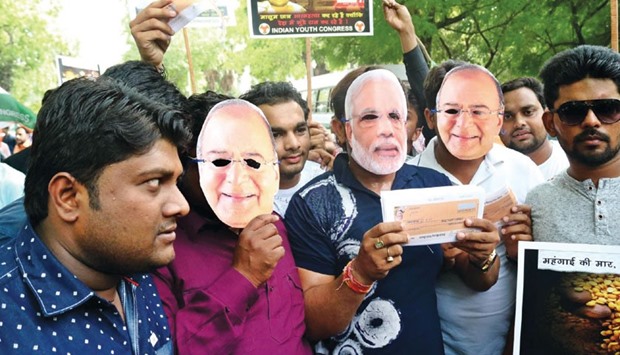
Youth Congress activists, some wearing the masks of Prime Minister Narendra Modi and Finance Minister Arun Jaitley stage a protest in New Delhi against the government which marked its second anniversary yesterday.
Prime Minister Narendra Modi has defended his record of reforming India’s stuttering economy after two years in power, but conceded that his government faced “an enormous task ahead.”
In an interview with The Wall Street Journal published yesterday, his second anniversary in office, Modi said he had set a path for faster growth, including opening up the economy to foreign investment and curbing corruption.
But Modi also said he needed India’s 29 states to take up the challenge of reforming land purchasing and rigid labour laws, which businesses have long complained hamper manufacturing and development.
“I have actually undertaken the maximum reforms,” Modi said.
But, he added, “I have an enormous task ahead for myself.”
The Bharatiya Janata Party leader swept to power at elections in May 2014 with the biggest mandate in 30 years, promising to reform and revive the struggling economy.
Growth has since risen to 7.60 % in the year ending March, sky-high inflation has dropped, the budget deficit has narrowed and foreign direct investment has soared.
But some investors are disappointed with a lack of “big bang” fundamental reforms to overhaul the economy that would further help pull millions of people out of poverty.
Investors were left deflated after Modi’s government failed to push a bill through India’s gridlocked parliament to make it easier to buy land for infrastructure and other development.
“When I came to the government, I used to sit down with all the experts and ask them to define for me what is the ‘big bang’ for them,” Modi said.”Nobody could tell me.”
Modi, who has formed a close relationship with US President Barack Obama, is set to address a joint meeting of the US Congress next month during a trip to Washington.
Modi said the invitation “is a matter of pride for me” adding that it was an “opportunity for me to address the American people.”
Although ties between New Delhi and Washington have strengthened, Modi played down any friction with China, pointing to increasing trade and diplomatic exchanges between Beijing and India.
Meanwhile, the prime minister took a jibe at the Congress and said the country was changing but the mindset of some people hasn’t changed.
“The country is changing, but the mindset of a few people hasn’t changed yet,” Modi said at a rally in Uttar Pradesh’s Saharanpur town.
He said he has come to Uttar Pradesh to represent the report card of his government’s work.
The state will hold assembly elections next year.
“As I have said from the ramparts of Red Fort that I am not a prime minister, but a pradhan sewak (chief helper) of the 1.25bn people of India, so I work non-stop to fulfil the aspirations of the poor and marginalised people of society,” the prime minister said.
“In the last two years I have tried my best to make the states more powerful so that it can work for the upliftof the poor and marginalised,” he added.
However, the BJP’s ally Shiv Sena presented its own report card yesterday on the second anniversary of Modi’s government, terming him a “high-flier” who is strong on announcements but short on delivery.
In the past two years, the BJP-led National Democratic Alliance (NDA) government has announced around 40 major schemes, but nothing has happened thereafter, the Shiv Sedna said in an editorial in the party mouthpiece Saamana.
The Shiv Sena is not only a constituent of the NDA but also shares power with the BJP in Maharashtra.
“Despite making a shower of various schemes, barely half a dozen, like ‘Swachh Bharat Abhiyan’, ‘Jan Dhan Yojana’ or ‘PM Gramin Sadak Yojana’ have reached the people... This means the country cannot be run merely on schemes,” the Sena said.
Taking another swipe at the Modi government, the Sena said the previous government had run the same schemes under different names, but due to large-scale corruption, the country’s economy got derailed.
